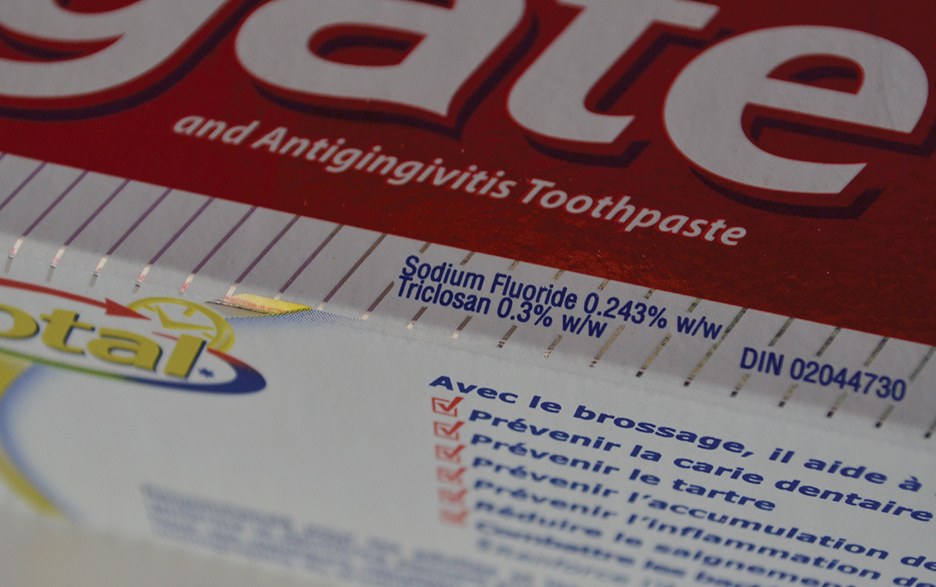Riverkeeper wants to keep chemical out
By Jullian Paquin
Ottawa Riverkeeper is pushing the federal government to ban triclosan, an anti-bacterial chemical that is making its way from our drains to our rivers. Triclosan is killing fish and creating a toxic environment in waterways across Canada, environmental advocates say.
The chemical was added to the List of Toxic Substances under the Canadian Environmental Protection Act in December. However, environmental organizations want it to be banned altogether.
Ottawa Riverkeeper is a local organization working to protect the Ottawa River ecosystem. They published a response on Feb. 23 outlining several reasons why the federal government should ban triclosan completely.
Triclosan is an anti-bacterial agent that is used in 1,600 cosmetic and personal care products in Canada, according to a report on chemical substances by Health Canada. It can be found in soaps, toothpastes, mouthwashes, facial cleansers and deodorants.
Health Canada limits the concentration of triclosan to 0.03 per cent in mouthwashes and 0.3 per cent in other products such as toothpaste. But even this limit isn’t enough to prevent harm from accumulations of triclosan in aquatic systems, according to Ottawa Riverkeeper.
The ecology organization said that 42 per cent of triclosan is not filtered out by wastewater management systems because the chemical doesn’t degrade quickly.
Triclosan is used in toothpaste as a way to prevent gingivitis. However, Ottawa Riverkeeper said the chemical’s use in hand-washes has been proven unnecessary, unless it’s being used within a hospital setting where there’s a need for anti-microbial soaps to prevent the spread of serious diseases.
The U.S. Food and Drug Administration recently banned triclosan because manufacturers were unable to demonstrate that it is safe for long-term use.
“One of the main factors as to why the U.S. banned triclosan from hand-washes is that there is no evidence that it’s more efficient that using plain soap and water” said Kaitlyn Mitchell, a lawyer from Toronto-based Ecojustice, another organization working to ban triclosan in Canada.
For regular households, using soap and water has been proven to be just as effective as using anti-bacterial cleansers without posing a threat to human health or the environment.
“The Liberal government said that they would embrace science-based approaches when it comes to environmental issues, so they should keep their promise,” said Mitchell.
Backed by groups like the Ottawa Riverkeeper, a coalition that includes, Ecojustice, Equiterre, the Canadian Association of Physicians for the Environment, Environmental Defence, and the David Suzuki Foundation made a submission in January to the department of Environment and Climate Change Canada outlining why the government should ban triclosan.
Triclosan is toxic to many freshwater and ocean organisms even at low concentrations, which negatively affects the general biodiversity of aquatic systems. When the chemical is released into waterways, it can kill or be absorbed in microscopic organisms like algae, a main food source for fish like the rainbow smelt.
Triclosan has also been found in frogs and earthworms.
The chemical causes a disruption in hormone function, which creates problems with growth and reproduction according to research by Environment Canada.
When triclosan is released into waterways, it is sometimes mixed with chlorine — found in drinking water — which turns it into chloroform, a highly toxic carcinogen.
Health Canada has maintained its position that “triclosan is safe for human health within identified maximum limits.”
However, the Canadian Partnership for Children’s Health and Environment is worried that there has not been enough research on its possible impact on health. Anti-bacterial agents such triclosan can disrupt normal hormone function for humans, as well, which is especially problematic for children.
Environment Canada has flagged triclosan for future assessment under the government’s Chemicals Management Plan but environmental groups want more concerted and immediate action.
“For now,” said Ottawa Riverkeeper’s Meredith Brown, “people can be mindful of the products that they use in their homes and can try their best to use products that don’t contain toxic substances like triclosan.”

